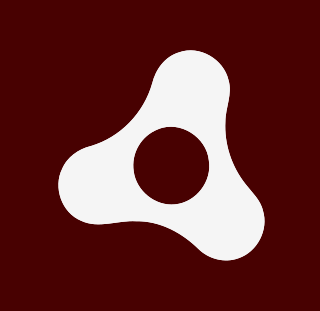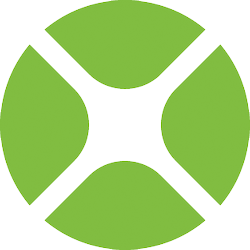
An integrated development environment (IDE) is a software application that provides comprehensive facilities to computer programmers for software development. An IDE normally consists of at least a source code editor, build automation tools and a debugger. Some IDEs, such as NetBeans and Eclipse, contain the necessary compiler, interpreter, or both; others, such as SharpDevelop and Lazarus, do not.
In computing, cross-platform software is computer software that is designed to work in several computing platforms. Some cross-platform software requires a separate build for each platform, but some can be directly run on any platform without special preparation, being written in an interpreted language or compiled to portable bytecode for which the interpreters or run-time packages are common or standard components of all supported platforms.

Gambas is the name of an object-oriented dialect of the BASIC programming language, as well as the integrated development environment that accompanies it. Designed to run on Linux and other Unix-like computer operating systems, its name is a recursive acronym for Gambas Almost Means Basic. Gambas is also the word for prawns in the Spanish, French, and Portuguese languages, from which the project's logos are derived.
C++Builder is a rapid application development (RAD) environment, originally developed by Borland and as of 2009 owned by Embarcadero Technologies, for writing programs in the C++ programming language currently targeting Windows, iOS and for several releases, macOS and Android C++Builder combines the Visual Component Library and IDE written in Object Pascal with multiple C++ compilers. Most components developed in Delphi can be used in C++Builder with no or little modification, although the reverse is not true, but this constraint is valid only for source code. Binary code generated by Delphi can easily be linked to binary code generated by C++Builder and vice versa to generate an executable written in both Object Pascal and C++. With this approach, C++ can be called from Object Pascal and vice versa. Since both Delphi and C++ use the same back end linker, the debugger can single step from Delphi code into C++ transparently.

Free Pascal Compiler (FPC) is a compiler for the closely related programming-language dialects Pascal and Object Pascal. It is free software released under the GNU General Public License, with exception clauses that allow static linking against its runtime libraries and packages for any purpose in combination with any other software license.

Arduino is an open-source hardware and software company, project, and user community that designs and manufactures single-board microcontrollers and microcontroller kits for building digital devices. Its hardware products are licensed under a CC BY-SA license, while software is licensed under the GNU Lesser General Public License (LGPL) or the GNU General Public License (GPL), permitting the manufacture of Arduino boards and software distribution by anyone. Arduino boards are available commercially from the official website or through authorized distributors.

Adobe AIR is a cross-platform runtime system currently developed by Harman International, in collaboration with Adobe Inc., for building desktop applications and mobile applications, programmed using Adobe Animate, ActionScript, and optionally Apache Flex. It was originally released in 2008. The runtime supports installable applications on Windows, macOS, and mobile operating systems, including Android, iOS, and BlackBerry Tablet OS.

FutureBasic is a free BASIC compiler for Apple Inc.'s Macintosh.
NS Basic is a family of development tools developed and commercially marketed by NSB Corporation in Toronto, Ontario, Canada for iOS, Android, Microsoft Windows, MacOS, Linux, BlackBerry OS, WebOS, Newton OS, Palm OS, Windows CE and Windows Mobile.
The Android SDK is a software development kit that includes a comprehensive set of development tools. These include a debugger, libraries, a handset emulator based on QEMU, documentation, sample code, and tutorials. Currently supported development platforms include computers running Linux, Mac OS X 10.5.8 or later, and Windows 7 or later. As of March 2015, the SDK is not available on Android itself, but software development is possible by using specialized Android applications.

FlashDevelop is an integrated development environment (IDE) for development of Adobe Flash websites, web applications, desktop applications and video games. The resulting applications run in Adobe Flash Player or Adobe AIR, on Microsoft Windows, Mac OS X, Android or iOS. The primary purpose of FlashDevelop is enabling developers to edit, compile, debug and publish a Flash ActionScript project. It supports ActionScript 2.0, ActionScript 3.0, Haxe and other upcoming languages. It has code completion, syntax highlighting, snippets and other features similar to Microsoft Visual Studio.
Basic4ppc is a programming language for Pocket PC handheld computers running Windows Mobile operating system, by Anywhere Software. The language is based on a BASIC-like syntax, taking advantage of Microsoft's .NET technology, to allow additional libraries, graphical user interface design of windows forms, rapid application development (RAD), and .NET framework compatible compilation. The language implements a unique way of adding objects to a program without being object-oriented. Its advantages are simplicity, development pace and the integration with .NET framework. A special version of the integrated development environment (IDE) allows developing straight onto the Windows Mobile device. With the demise of Windows Mobile operating system and the devices running it Basic4PPC came to the end of its life in about 2012. For owners of Basic4PPC it remains a useful Windows-desktop BASIC compiler as it runs code directly in the Windows environment and it can compile a project to a Windows 'exe' file for use as a Windows program.

Mono is a free and open-source .NET Framework-compatible software framework. Originally by Ximian, it was later acquired by Novell, and is now being led by Xamarin, a subsidiary of Microsoft and the .NET Foundation. Mono can be run on many software systems.

The Xojo programming environment and programming language is developed and commercially marketed by Xojo, Inc. of Austin, Texas for software development targeting macOS, Microsoft Windows, Linux, iOS, the Web and Raspberry Pi. Xojo uses a proprietary object-oriented language.

JetBrains s.r.o. is a Czech software development company which makes tools for software developers and project managers. As of 2019, the company has offices in Prague, Saint Petersburg, Moscow, Munich, Boston, Novosibirsk, Amsterdam, Foster City and Marlton, New Jersey.
Basic4Android is a rapid application development tool for native Android applications, developed and marketed by Anywhere Software Ltd.

Intel Galileo is the first in a line of Arduino-certified development boards based on Intel x86 architecture and is designed for the maker and education communities. Intel released two versions of Galileo, referred to as Gen 1 and Gen 2. These development boards are sometimes called "Breakout boards".

Codeanywhere is a cross-platform cloud integrated development environment created by Codeanywhere, Inc. Codeanywhere enables users to instantly write, edit, collaborate and run web development projects from a web browser and any mobile device.
This page details the history of the programming language and software product Delphi.











